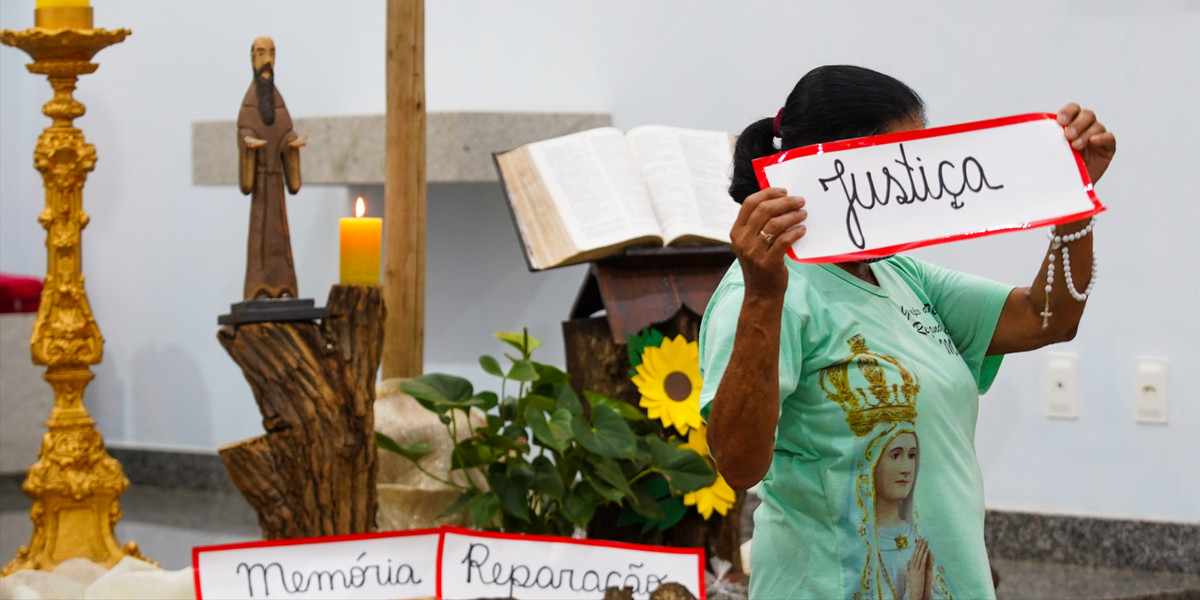Saturday 25th January 2025 marked the anniversary of the Brumadinho disaster where 272 people died in Brumadinho, Minas Gerais, Brazil, due to a dam collapse. As every year since the tragedy occurred six years ago, CIDSE remembers the victims.
After five years of claiming justice, some developments have occurred. On 1st October 2024, the Comissão de Valores Mobiliários (CVM, Securities and Exchange Commissionn, in English) began the hearings of former CEO of Vale S.A. (VALE3), Fabio Schvartsman, and former Director of ‘Ferrosos e Carvão’, Gerd Peter Poppinga, both accused of negligence and failing to disclose crucial information that could have potentially prevented the disaster.
As reported by Both Ends, the CVM Director Maeda voted to convict Poppinga to a penalty of R$ 27 million (US$ 4.97 million), highlighting his duty to be informed and oversee the company’s operations. However, Schvartsman was acquitted because his responsibilities as the company CEO did not include direct oversight of the dam, according to the CVM Director.
In January 2020, Brazilian prosecutors formally charged Vale S.A., the auditor TÜV Süd, and 16 individuals, including Schvartsman, with intentional homicide and environmental crimes. Furthermore, in January 2021, a group of Brazilian plaintiffs initiated a civil lawsuit in Germany against TÜV Süd.
The Brumadinho incident underscores the need for strong legislative measures that compel businesses to uphold human rights and protect the environment. The EU Corporate Sustainability Due Diligence Directive (CSDDD) came into effect in July 2024, requiring Member States to transpose it into their national laws within two years. CIDSE urges all EU Member States to expedite this transposition process. As stated in the civil society organisations (CSOs) transposition guide, they should:
- Ensure robust due diligence rather than mere ‘tick-box’ compliance,
- Incorporate due diligence into everyday business operations,
- Align their obligations with international standards,
- Effectively involve rights and stakeholders,
- Provide resources for Supervisory Authorities, and
- Guarantee adequate access to justice.
It is important to note that the CSDDD marks a significant achievement for advocates globally who defend our common home and uphold human dignity from the harmful impacts of profit-driven corporate behavior. Recently, the European Commission announced an Omnibus simplification package aimed at reducing reporting obligations for companies, which could jeopardise the CSDDD. Numerous CSOs, businesses, and faith-based actors have pointed out the serious dangers of reopening the Directive, risking the prevention of disastrous events like the Brumadinho dam disaster. This move would also weaken the EU’s capacity to meet its climate objectives and ensure a sustainable future for all.
Additional reading:
“Le recul de la Commission européenne sur le devoir de vigilance européen revient à affaiblir la lutte contre les abus des multinationales‘, opinion article, co-signed by Virginie Amieux, President of CCFD-Terre Solidaire, Carolina Moura, resident of Brumadinho and member of the Cordilheira Institute for the Defence of the Environment, and Dominique Potier, member of French Parliament, published in Le Monde on 1st February 2025.
Contact: Susana Hernández Torres, Corporate Regulation Officer, CIDSE (hernandez(at)cidse.org)
Cover photo credit: Guilherme Cavalli-IyM

